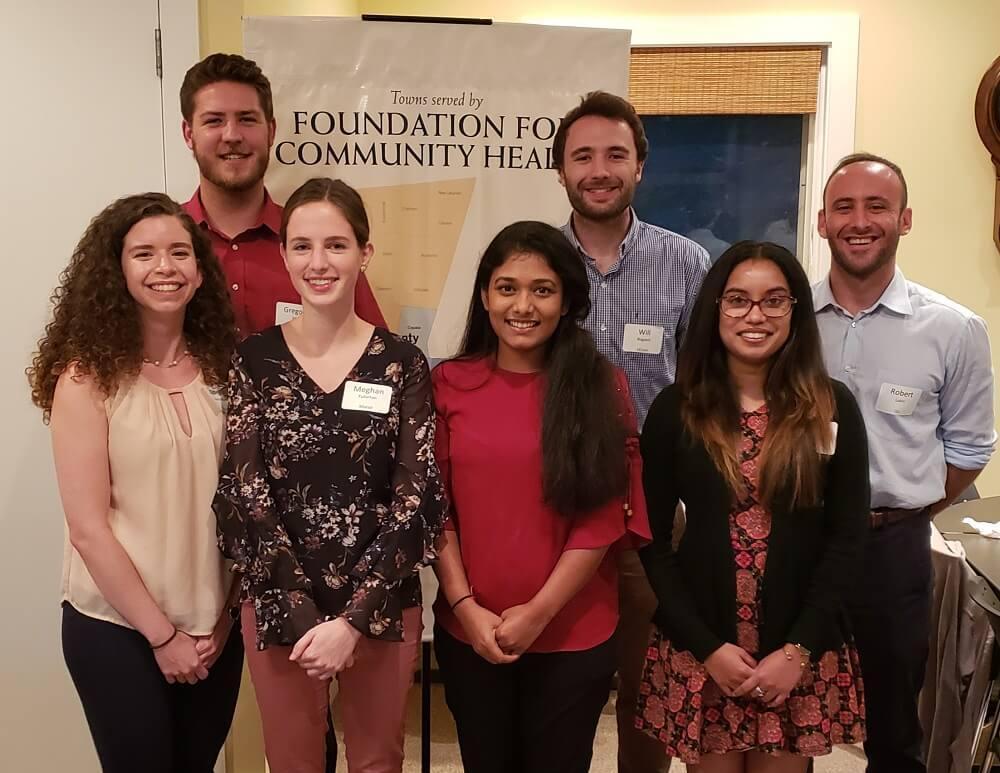TouroCOM Middletown Students Practiced Rural Medicine This Summer
Four TouroCOM Students from the Middletown Campus Experienced What It Is Like to Practice Medicine in a Rural Community in Connecticut as Part of The Summer Immersion Program

Abigail Dominguez-Trujillo, Simran Pandey, Devyani Ramgobin, and Gregory May from Touro College of Osteopathic Medicine (TouroCOM) Middletown campus, along five other medical students from the surrounding areas—visited various healthcare facilities in Northwest Connecticut and Northwest New York as part of The Summer Rural Immersion Program. The program, organized by The Foundation for Community Health, is a wide-ranging program that allows students to see the various challenges and rewards of practicing medicine in rural and underserved areas.
During the two-week program, the students worked with medical practitioners at Sharon Hospital, Hudson River Health Care Community Health Center, Geer Nursing and Rehabilitation Center, Salisbury Visiting Nurse Association, North Canaan Emergency Medical Service, Hospice, Noble Horizons Retirement Community, and at a migrant farm workers clinic.
“It was an amazing experience,” stated Dominguez-Trujillo. “I got to help with healthcare in different community settings, from working in a hospital, to working with visiting nurses and working with farm migrant workers. That last experience took my heart away. The migrant workers were so appreciative of everything we did.”
The program was fairly open and students were allowed to choose where they wanted to spend their time.
“I shadowed a nurse who visited a 98-year-old patient in palliative care,” said Pandey. “The whole point wasn’t to give them extensive treatment, but just to make them comfortable. I had never experienced that before.”
“I wanted to broaden my experience and the fact that the program let me see so many different aspects of medical practice was wonderful,” added May. “We got to see what it was like to practice in a rural and close-knit community. When you practice emergency medicine in an urban area you tend not to develop relationships with your patients, but it’s not like that in a rural community. We also were able to see how everyone on a healthcare team works together, from a physical therapist to nurses and social workers.”
May said that his favorite part of the trip was working in the emergency medicine department, where he eventually plans to specialize.
“I was able to see a lot and it re-affirmed to me that I felt most at home there,” said May.
The internship wasn’t only work—the interns also enjoyed local cultural activities in the areas including plays and restaurants around the popular Tanglewood area in MA.
The four TouroCOM students each mentioned how friendly the community was.
“Patients are more appreciative than they would be in an inner-city environment,” said Ramgobin. “It opened my eyes to what it would be like to practice medicine in a rural area.”
“I felt a sense of belonging,” said Pandey. “I spent two weeks there and it was as if I was a part of their community. I met nurses and it felt like I had met them before. I saw patients in the emergency room and then I met the patient’s wife while I was shadowing visiting nurses. Had someone asked me if I wanted to work in a rural area, I would have been hesitant, but now I’d be okay with it.”
Another surprise was how much of an impact a single physician could have in the area.
“Since it was a rural part of Connecticut, the primary care doctors played the role of all the major specialists,” said Pandey. “If you’re in the big city, you’ll get referred to a specialist, but in rural areas, frequently specialists aren’t available. If a case was under the physician’s control, typically they tried to treat the patient.”
Dominguez-Truijillo used some of the osteopathic manipulative medicine she learned during her first year with a patient, helping them expand the motion of their injured shoulder and using counterstrain techniques to help build the muscle.
“The best part of the program for me was that it re-affirmed why I went into medicine in the first place,” she said. “I got to see what it’s like to put my skills to the test. I was blown away by how much I learned from one year in medical school and how well my professors prepared me.”

